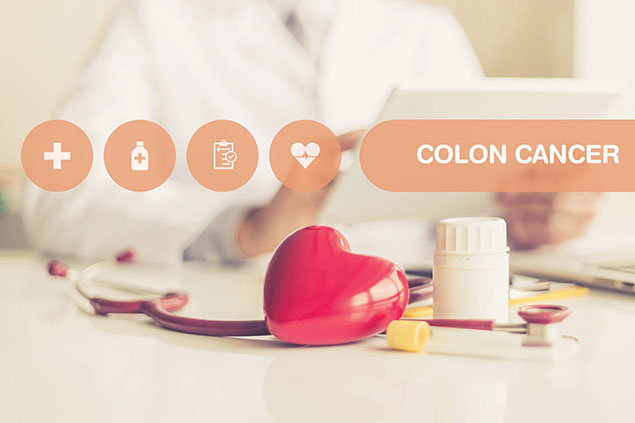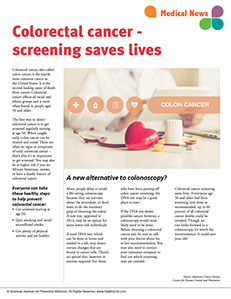SYMPTOM CHECKER
CONDITIONS
Male
Female
Child
Arm, Hand & Shoulder Concerns
Legs & Feet Concerns
Dental & Mouth Concerns
Ear & Nose
Eye Conditions
Head Conditions
Arm, Hand & Shoulder Concerns
Legs & Feet Concerns
Front
Back
Arm, Hand & Shoulder Concerns
Dental & Mouth Concerns
Ear & Nose
Eye Conditions
Head Conditions
Arm, Hand & Shoulder Concerns
Dental & Mouth Concerns
Ear & Nose
Eye Conditions
Head Conditions
Front
Back
Arm, Hand & Shoulder Concerns
Neck Links
Head & Neck Concerns
Arm, Hand & Shoulder Concerns
Neck Links
Head & Neck Concerns
Front
Back
Online Clinic
Wise Healthcare
Colorectal cancer - screening saves lives
Print on Demand
Colorectal cancer, also called colon cancer, is the fourth most common cancer in the United States. It is the second leading cause of death from cancer. Colorectal cancer affects all racial and ethnic groups and is most often found in people ages 50 and older.
The best way to detect colorectal cancer is to get screened regularly starting at age 50. When caught early, colon cancer can be treated and cured. There are often no signs or symptoms of early colorectal cancer – that’s why it’s so important to get screened. You may also be at higher risk if you are African American, smoke, or have a family history of colorectal cancer.
Everyone can take these healthy steps to help prevent colorectal cancer:
• Get screened starting at age 50.
• Quit smoking and avoid secondhand smoke.
• Get plenty of physical activity and eat healthy.
A new alternative to colonoscopy?
Many people delay or avoid a life-saving colonoscopy because they are nervous about the procedure, or don’t want to do the necessary prep of cleansing the colon. A new test, approved in 2014, may be an option for some lower-risk individuals.
A stool DNA test, which can be done at home and mailed to a lab, may detect certain changes that are found in cancer cells. There’s no special diet, laxatives or enemas required. For those who have been putting off colon cancer screening, the DNA test may be a good place to start.
If the DNA test shows possible cancer, however, a colonoscopy would most likely need to be done. Before choosing a colorectal cancer test, be sure to talk with your doctor about his or her recommendation. You may also need to contact your insurance company to find out which screening tests are covered.
Colorectal cancer screening saves lives. If everyone age 50 and older had their screening tests done as recommended, up to 60 percent of all colorectal cancer deaths could be avoided. Though no one looks forward to a colonoscopy, it’s worth the inconvenience. It could save your life!
Source: American Cancer Society, Centers for Disease Control and Prevention
This website is not meant to substitute for expert medical advice or treatment. Follow your doctor’s or health care provider’s advice if it differs from what is given in this guide.
The American Institute for Preventive Medicine (AIPM) is not responsible for the availability or content of external sites, nor does AIPM endorse them. Also, it is the responsibility of the user to examine the copyright and licensing restrictions of external pages and to secure all necessary permission.
The content on this website is proprietary. You may not modify, copy, reproduce, republish, upload, post, transmit, or distribute, in any manner, the material on the website without the written permission of AIPM.
2021 © American Institute for Preventive Medicine - All Rights Reserved. Disclaimer | www.HealthyLife.com
















































